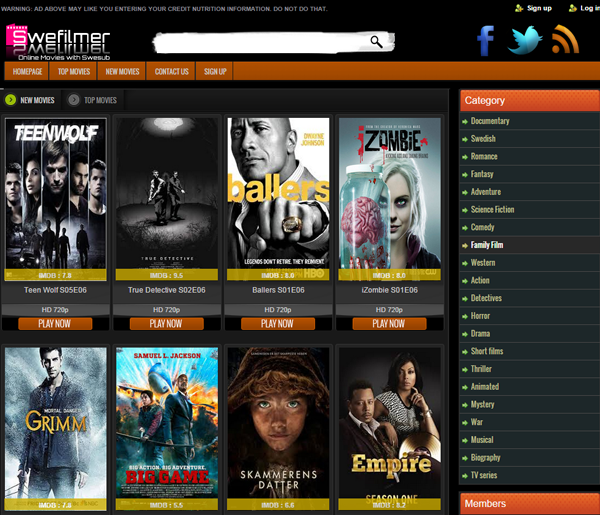 Founded half a decade ago, Swefilmer grew to become Sweden’s most popular movie and TV show streaming site. At one stage, Swefilmer and fellow streaming site Dreamfilm were said to account for 25% of all web TV viewing in Sweden.
Founded half a decade ago, Swefilmer grew to become Sweden’s most popular movie and TV show streaming site. At one stage, Swefilmer and fellow streaming site Dreamfilm were said to account for 25% of all web TV viewing in Sweden.
In 2015, local man Ola Johansson took to the Internet to reveal that he’d been raided by the police under suspicion of being involved in running the site. In March 2016, a Turkish national was arrested in Germany on a secret European arrest warrant.
After a couple of false starts, one last June and another this January, the case finally got underway yesterday in Sweden.
The pair stand accused of the unlawful distribution of around 1,400 movies, owned by a dozen studios including Warner, Disney and Fox. Investigators tested 67 of the titles and ten had been made available online before their DVD release.
Anti-piracy group Rights Alliance claims that the site generated a lot of money from advertising without paying for the appropriate licenses. On the table are potential convictions for copyright infringement and money laundering.
Follow the money
In common with so many file-sharing related cases, it’s clear that the men in this case were tracked down from traces left online. Those included IP address evidence and money trails from both advertising revenues and site donations.
According to Sveriges Radio who were in court yesterday, police were able to trace two IP addresses used to operate Swefilmer back to Turkey.
In an effort to trace the bank account used by the site to hold funds, the prosecutor then sought assistance from Turkish authorities. After obtaining the name of the 26-year-old, the prosecutor was then able to link that with advertising revenue generated by the site.

Swefilmer also had a PayPal account used to receive donations and payments for VIP memberships. That account was targeted by an investigator from Rights Alliance who donated money via the same method. That allowed the group to launch an investigation with the payment processor.
The PayPal inquiry appears to have been quite fruitful. The receipt from the donation revealed the account name and from there PayPal apparently gave up the email and bank account details connected to the account. These were linked to the 26-year-old by the prosecutor.
Advertising
The site’s connections with its advertisers also proved useful to investigators. The prosecution claimed that Swefilmer received its first payment in 2013 and its last in 2015. The money generated, some $1.5m (14m kronor), was deposited in a bank account operated by the 26-year-old by a Stockholm-based ad company.
The court heard that while the CEO of the advertising company had been questioned in connection with the case, he is not suspected of crimes.
Connecting the site’s operators
While the exact mechanism is unclear, investigators from Rights Alliance managed to find an IP address used by the 22-year-old. This IP was then traced back to his parents’ home in Kungsbacka, Sweden. The same IP address was used to access the man’s Facebook page.
In court, the prosecution read out chat conversations between both men. They revealed that the men knew each other only through chat and that the younger man believed the older was from Russia.
The prosecution’s case is that the 26-year-old was the ring-leader and that his colleague was a minor player. With that in mind, the latter is required to pay back around $4,000, which is the money he earned from the site.
For the older man, the situation is much more serious. The prosecution is seeking all of the money the site made from advertising, a cool $1.5m.
The case was initially set to go ahead last year but was postponed pending a ruling from the European Court of Justice. Last September, the Court determined that it was illegal to link to copyrighted material if profit was being made.
Claes Kennedy, the lawyer for the 22-year-old, insists that his client did nothing wrong. His actions took place before the ECJ’s ruling so should be determined legal, he says.
The case continues.





